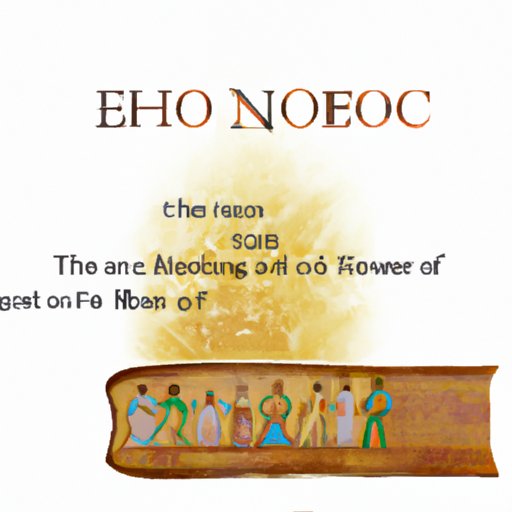I. Introduction
The Bible is one of the world’s most influential and widely read texts, shaping the beliefs and practices of millions of people across the globe. However, not all religious texts are included in the Bible, including the Book of Enoch. This ancient work has intrigued scholars and believers alike, but its exclusion from the biblical canon has led to questions about its history, themes, and significance. In this article, we will explore why the Book of Enoch is not in the Bible and what this tells us about the development of religious traditions and ideas.
II. History and Context of the Book of Enoch
The Book of Enoch is an ancient Jewish text attributed to the prophet Enoch, who was said to have lived in the pre-flood era. It was likely written in the third century BCE or earlier and circulated among different Jewish and Christian communities. The text contains vivid descriptions of heavenly visions, angelic beings, and prophetic messages, emphasizing themes of judgment, redemption, and divine wisdom. The Book of Enoch was among the many writings that circulated in the Jewish and Christian world but was not included in the Jewish or Christian biblical canons.
There are several reasons why the Book of Enoch was excluded from the biblical canon. One of the most significant factors was theological disagreements among Jewish and Christian authorities. Some of the teachings and themes in the Book of Enoch diverged from the mainstream religious traditions of the time, leading to concerns about its orthodoxy and authenticity. Additionally, linguistic and cultural differences may have contributed to the exclusion of the Book of Enoch, as it was written in Aramaic rather than Hebrew and reflected multiple cultural influences.
III. Themes and Messages of the Book of Enoch
The Book of Enoch emphasizes several themes that are also present in other books of the Bible, such as the idea of the coming of a messianic figure, the role of angels in divine judgment, and the importance of moral righteousness. However, the Book of Enoch also contains unique teachings, such as the existence of a group of fallen angels who have rebelled against God and taught humans various forms of knowledge and magic. The Book of Enoch also provides an intricate system of cosmology and angelology, depicting the structure of the heavens and the hierarchy of heavenly beings.
The Book of Enoch has influenced the development of Jewish and Christian apocalyptic and millennialist traditions, which emphasize the coming of a cataclysmic event that will bring about either a Golden Age or a final judgment. Some scholars suggest that the Book of Enoch may have been a source of inspiration for the Book of Revelation, which shares similar themes and imagery.
IV. Reasons for the Exclusion of the Book of Enoch
The exclusion of the Book of Enoch from the biblical canon was the result of several factors, including theological disagreements, linguistic and cultural differences, and political considerations. Jewish and Christian authorities were concerned about the variety of teachings and themes presented in the Book of Enoch, particularly those related to angels, fallen beings, and the afterlife. These teachings were regarded as deviant or heretical by some religious leaders, leading to the Book of Enoch’s marginalization from mainstream religious discourse.
The composition of the Book of Enoch in Aramaic and its distinctive literary style may have also contributed to its exclusion from the biblical canon. The Book of Enoch’s language and structure differed significantly from other biblical texts, making it harder to interpret and understand by readers and scholars. Finally, political factors such as the suppression of Jewish and Christian communities by Roman authorities may have influenced the exclusion of the Book of Enoch from the Bible, as the text was associated with non-Roman or dissident religious movements.
V. Legacy and Influence of the Book of Enoch
The Book of Enoch has had a lasting impact on religious, cultural, and intellectual traditions, despite its exclusion from the biblical canon. The text was relatively unknown in the West until the 19th century, when the discovery of the Ethiopian Book of Enoch sparked renewed interest in the text among scholars and religious communities. The Book of Enoch played a significant role in the formation of the Dead Sea Scrolls, a collection of Jewish texts from the Second Temple period that include fragments of the Book of Enoch.
The Book of Enoch also influenced the development of Ethiopian Christianity, where the text is considered a canonical scripture. The Ethiopian Book of Enoch contains additional material not found in other versions of the Book, demonstrating the fluidity and multivocality of religious texts over time.
Modern scholars and religious communities continue to interpret and use the Book of Enoch in diverse ways. Some religious groups see the Book of Enoch as a source of esoteric knowledge and spiritual guidance, while others view it as a fascinating artifact of ancient history and culture. The Book of Enoch has also been adapted and incorporated into contemporary apocryphal and gnostic texts, illustrating the ongoing fascination with the text among alternative religious movements.
VI. Conclusion
The Book of Enoch offers valuable insights into the development of religious ideas and traditions, as well as the complex relationship between religious texts and communities. The exclusion of the Book of Enoch from the biblical canon was the result of various factors, including theological disputes, cultural and linguistic differences, and political considerations. However, the enduring legacy and influence of the Book of Enoch demonstrate the ongoing relevance and significance of ancient texts for contemporary religious discourse and intellectual inquiry.
If you’re interested in learning more about the Book of Enoch and its place in the history of religion and culture, we encourage you to explore further resources and scholarship on the topic. Understanding the origins and meanings of religious texts is essential for cultivating interfaith dialogue and respecting the diversity of beliefs and practices across the world.
